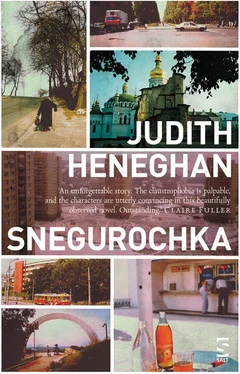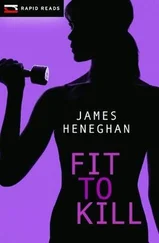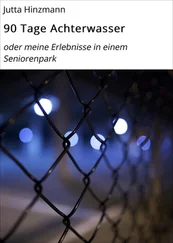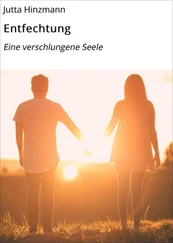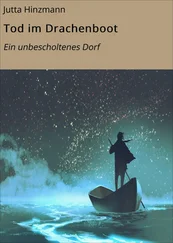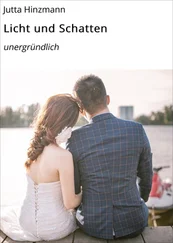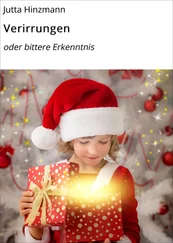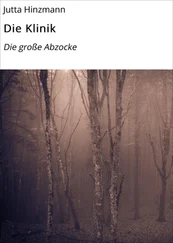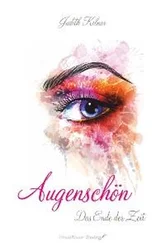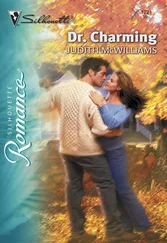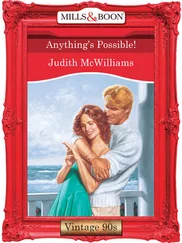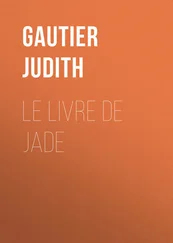When they reach the entrance, she lifts him up and carries him through the heavy doors, nods quickly at the new dezhornaya peering out of her cubicle, then directs her son’s hand so that he can summon the lift.
‘ Adeen, dva, tre, chitirye ,’ she counts, right up to thirteen, in a funny voice that makes him giggle.
Upstairs on the landing, in the open doorway of the apartment, she pauses. Lucas is out, packing up his equipment at the office, shredding old files. The rooms are silent; the ceiling is silent above her head. She closes the front door behind her and settles Ivan on the parquet before moving to the kitchen to bathe her hand. Only then does she slide the stolen pears from her skirt pockets, sniff their musty sweetness and take a knife out of the drawer to cut away the bruised flesh. She saves the pips in a saucer, thinking she might plant them by the fence on the waste ground or leave them on the windowsill for the birds. The rest she slices into slivers, pale and glistening with juice.
‘Tea time, Ivan,’ she murmurs as she carries the plate through to the living room and sets it on the sofa for her son.
The afternoons are growing shorter already. Soon the women spilling from the trams will dig out their winter hats, but for now the warmth lingers. Rachel stands at the balcony window long after the fruit has been eaten, listening to the slap of Ivan’s bare feet as he cruises down the hallway. He will want his milk soon, she thinks, as she gazes at the trees and roofs of Tsarskoye Selo, as the sun draws itself over the back of the apartment blocks, as the silver ribbon of the river, the gold domes of the monastery and, finally, the glinting sword tip of the Motherland statue lose their lustre and sink into shadow.
I AM HUGELY indebted to many friends, colleagues, students and fellow writers.
My thanks to the Hyde Writers, whose early enthusiasm gave me the confidence to continue. I owe particular thanks to Richard Stillman and Paul Davies. Thanks also to the St James Taverners – I came late but you didn’t mind. It is a privilege to share work with such fine novelists and poets.
I am eternally grateful to Carole Burns and to Claire Fuller for reading entire drafts, for constant encouragement and for pointing out the things I could not see. Thanks to Paul Ayling and Ruth Cruickshank, to Anne Booth and Virginia Moffatt and many other kind and brilliant friends.
My creative writing colleagues at the University of Winchester are the best – all of them. Thanks Julian Stannard, Nick Joseph, Mick Jardine, Stephen Thompson, Vanessa Harbour, Judy Waite, Mark Rutter, Glenn Fosbraey and Kass Boucher for wine and irreverent writing talk. Special thanks must go to Andrew Melrose and Amanda Boulter for their steadfast support via the Doctor of Creative Arts programme.
Without Paul Anderson, who has generously read the manuscript and made suggestions, I would never have travelled to Kiev. Heather Griffiths dug out her copy of Tim Burford’s Hiking Guide to Poland & Ukraine and recalled sights I had nearly forgotten. Thank you both. My thanks also to Irina Oxley and to Floradarya Rustamova who helped with some Russian vocabulary. Any errors are mine alone.
My most particular thanks go to wonderful Chris and Jen Hamilton-Emery at Salt and of course to Linda Bennett, my visionary editor. Linda not only took me on as a Salt author, she supplied me with Sour Cherry Patches at the exact moment I needed them.
Final thanks and huge love to my family: Patrick and Erica, Sarah and Jon and Jonathan and Anne along with my nieces and nephews; my dear mother Gill Heneghan, who travelled out to Kiev to make sure I was all right; my late father Michael Heneghan; and most especially my children Rory, Nellie, Jeremy and Meriel. Francesca too. Ice creams all round.
‘An unforgettable story. The claustrophobia is palpable, and the characters are utterly convincing in this beautifully observed novel. Outstanding.’
—Claire Fuller
‘This is a fascinating portrayal of Kiev and its people, written with skill, depth and sympathy but never shying away from darker facets. At its heart is the story of a marriage, of motherhood, and of a place contaminated by its terrible history. It is an alluring and gratifying read.’
—Jackie Law, neverimitate
JUDITH HENEGHAN is a writer and editor. She spent several years in Ukraine and Russia with her young family in the 1990s and now teaches creative writing at the University of Winchester. She has four grown up children.
Published by Salt Publishing Ltd
12 Norwich Road, Cromer, Norfolk NR27 0AX
All rights reserved
Copyright © Judith Heneghan, 2019
The right of Judith Heneghan to be identified as the author of this work has been asserted by her in accordance with Section 77 of the Copyright, Designs and Patents Act 1988.
This book is in copyright. Subject to statutory exception and to provisions of relevant collective licensing agreements, no reproduction of any part may take place without the written permission of Salt Publishing.
Salt Publishing 2019
Created by Salt Publishing Ltd
This book is sold subject to the conditions that it shall not, by way of trade or otherwise, be lent, re-sold, hired out, or otherwise circulated without the publisher’s prior consent in any form of binding or cover other than that in which it is published and without a similar condition including this condition being imposed on the subsequent purchaser.
ISBN 978-1-78463-175-8 electronic
